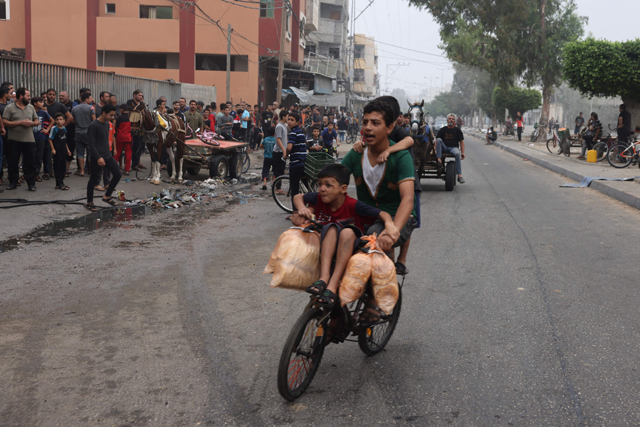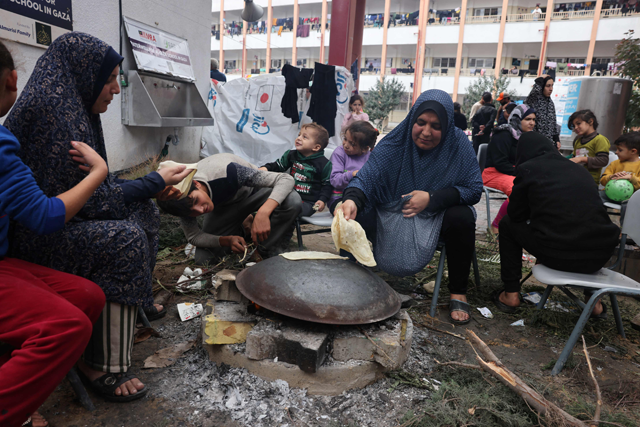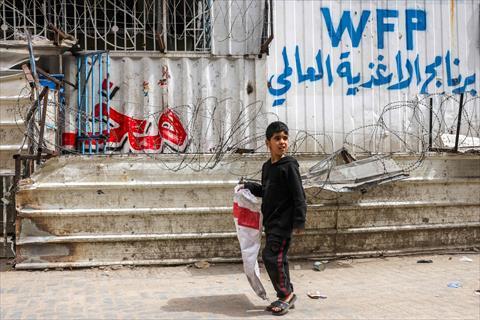You are here
UN agency finds unexploded 1,000-pound bombs in Gaza schools
By AFP - Apr 17,2024 - Last updated at Apr 17,2024

People inspect the damage amid the rubble of buildings destroyed during Israeli bombardment in Khan Yunis, on the southern Gaza Strip on Tuesday, as fighting continues between Israel and the Hamas (AFP photo)
The Israeli army has carried out relentless air strikes and bombardments in Gaza since Hamas fighters attacked Israel on October 7.
UN agencies led an "assessment mission" in Khan Yunis after Israeli forces withdrew from the embattled city last week, UNRWA said.
It found "significant challenges in operating safely due to the presence of unexploded ordnance [UXOs], including 1,000-pound bombs inside schools and on roads".
"Thousands of internally displaced persons [IDPs] require a range of lifesaving assistance, including health, water and sanitation, and food," it said.
Earlier this month, the United Nations said it would take "millions of dollars and many years to decontaminate the [Gaza] Strip from unexploded munitions".
"We work off the rule of thumb that 10 per cent of ordnance doesn't function as designed," UN Mine Action Service chief Charles Birch said in a statement earlier this month.
"We estimate that, to begin the clearance of Gaza, we need around $45 million."
The October 7 Hamas sudden attack that triggered the war resulted in the deaths of 1,170 people in Israel, mostly civilians, according to an AFP tally of Israeli official figures.
Israel's retaliatory offensive has killed at least 33,843 people in Gaza, mostly women and children, according to the health ministry in the Hamas-run territory.
Hundreds of Palestinians queued for bread at a reopened bakery in Gaza City, after fresh supplies arrived in a heavily blockaded area that has suffered months of deprivation.
They waited for hours in the streets of Gaza's biggest city this week as the bakery turned out bags of subsidised bread after the World Food Programme was able to resupply it.
Children stood patiently in line alongside young men and elderly people.
“When Israel prevented us from getting flour, we started eating corn and barley, until it reached the point where we had to eat some animal feed,” Wissam Dawad told AFP as he stood in the queue.
Firas Sukkar, also queueing, said, “I’m happy but I swear by God we are tired”.
“We have lost our sons, daughters, and wives. We have lost our entire lives,” he said.
“What more can I ask for?” he added. “My only message is to stop the war.”
Israel has faced growing global opposition to the relentless war it is fighting against Hamas in the Gaza Strip, which has reduced vast areas of territory to a wasteland of gutted buildings, bomb craters and rubble.
The war and the siege have triggered a dire humanitarian crisis, with desperate shortages of food, water, medicines and fuel, helped only by sporadic aid deliveries.
The United Nations has warned that the Gaza war and siege have caused “the highest levels of catastrophic hunger in the world”.
Israeli prime minister Benjamin Netanyahu has vowed to push ahead with the war despite the opposition.
“Bakeries have been unable to operate for several months due to conflict and lack of access,” the World Food Programme said on Sunday, announcing it had “delivered fuel to a bakery in Gaza to start producing bread.”
“We need safe and sustained access to prevent famine,” it warned in a post on social media network X, formerly known as Twitter.
Gaza resident Khaled Al Ghoula told AFP he “waited for six hours to get a loaf of bread”.
“It’s an extremely difficult struggle,” he said. “It’s unfair.”
“The available quantities are obviously not sufficient,” said Moataz Ajour, surrounded by workers packing the bread in a back room of the bakery.
“We hope that people and the World Food Programme will also support us, so that the quantities are enough, and we can continue our work.”
Related Articles
RAFAH, Occupied Palestine — Etidal Al Masri got up before dawn to reach the bakery in Rafah in the hopes of getting enough bread to feed her
KHAN YUNIS, Palestine — One of the last grain warehouses in the Gaza Strip has been damaged by Israeli strikes and a key flour mill in Khan














